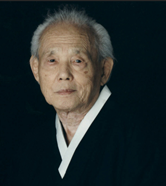History of Soo Bahk Do (Tang Soo Do)
 In Korea, the indigenous arts of self defense (Soo Bahk Ki and Tae Kyun) were combined with other fighting principles (Northern and Southern Chinese Kung Fu) and moral guidelines such as the philosophy of Do (Tao), No Ja (Lao Tzu) and Lee Do Ja (Confucius) by Grandmaster Hwang Kee into what is now known as Soo Bahk Do Moo Duk Kwan. This combination of techniques and philosophy resulted in the development of a form of self defense and mental conditioning unrivaled in the modern world. The founder of the Moo Duk Kwan, Grandmaster created the Moo Duk Kwan on November 9th 1945. Grand Master Hwang Kee was first inspired to study the Martial arts in 1921 when he was about seven years old. At a traditional Festival called "Dan O" he was visiting a nearby village, where they had archery, wrestling and many other festivities. As Grand Master was enjoying the festival a group of seven or eight men had a dispute with another man. Suddenly the group of men attacked the lone man, who began evading and counter attacking with his feet, eventually defeating the group of men. This ability to defend oneself against several attackers so impressed Grand Master that at that moment he knew he wanted to learn the martial arts. Several years Grand Master Hwang Kee studied and researched every available source, and at the age of 22 he was recognized as a Master among other martial artists. In May of 1935 Grand Master began working for the Korean railroad company which allowed him to travel. In May of 1936 he met a Chinese Kung Fu master named Yang, Kuk Jin. Grand Master trained with Master Yang until 1946, at that time China became a communist country. The training consisted of Seh Bop (postures), Bo Bop (steps), Ryun Bop (conditioning) and Hyung (Forms) with their applications. November 9th 1945 Grandmaster Hwang Kee founded the Moo Duk Kwan. The basic ideal of the Moo Duk Kwan is the development of its participants. Strong individuals in Spirit and Body make strong communities, strong communities make strong nations, Strong and peaceful nations make a strong and peaceful world.
In Korea, the indigenous arts of self defense (Soo Bahk Ki and Tae Kyun) were combined with other fighting principles (Northern and Southern Chinese Kung Fu) and moral guidelines such as the philosophy of Do (Tao), No Ja (Lao Tzu) and Lee Do Ja (Confucius) by Grandmaster Hwang Kee into what is now known as Soo Bahk Do Moo Duk Kwan. This combination of techniques and philosophy resulted in the development of a form of self defense and mental conditioning unrivaled in the modern world. The founder of the Moo Duk Kwan, Grandmaster created the Moo Duk Kwan on November 9th 1945. Grand Master Hwang Kee was first inspired to study the Martial arts in 1921 when he was about seven years old. At a traditional Festival called "Dan O" he was visiting a nearby village, where they had archery, wrestling and many other festivities. As Grand Master was enjoying the festival a group of seven or eight men had a dispute with another man. Suddenly the group of men attacked the lone man, who began evading and counter attacking with his feet, eventually defeating the group of men. This ability to defend oneself against several attackers so impressed Grand Master that at that moment he knew he wanted to learn the martial arts. Several years Grand Master Hwang Kee studied and researched every available source, and at the age of 22 he was recognized as a Master among other martial artists. In May of 1935 Grand Master began working for the Korean railroad company which allowed him to travel. In May of 1936 he met a Chinese Kung Fu master named Yang, Kuk Jin. Grand Master trained with Master Yang until 1946, at that time China became a communist country. The training consisted of Seh Bop (postures), Bo Bop (steps), Ryun Bop (conditioning) and Hyung (Forms) with their applications. November 9th 1945 Grandmaster Hwang Kee founded the Moo Duk Kwan. The basic ideal of the Moo Duk Kwan is the development of its participants. Strong individuals in Spirit and Body make strong communities, strong communities make strong nations, Strong and peaceful nations make a strong and peaceful world.